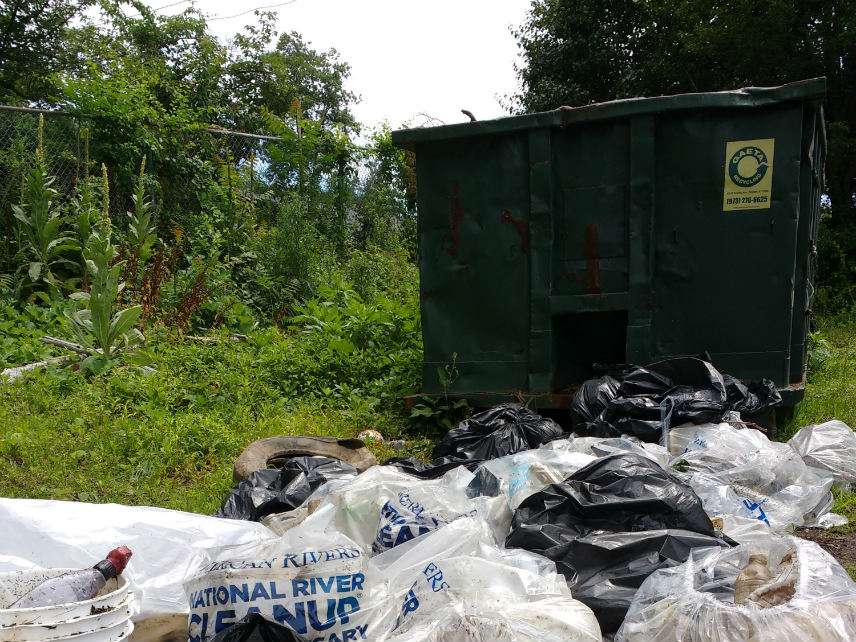New Jersey Plans a Plastic-Banning Spree
The Garden State wants to ban plastic bags, straws, and Styrofoam.

New Jersey is mulling a sweeping plastics ban aimed at reducing litter and changing lives. Though billed as the toughest plastic prohibition in the country, the bill also includes a number of carve-outs and exemptions that weaken both its impact and the justification for legislative action.
"It requires New Jersey citizens to change their lifestyle," said bill sponsor State Sen. Bob Smith (D–Middlesex) according to Northjersey.com.
Smith's bill, SB 2776, would ban plastic bags, straws, and polystyrene foam food packaging in the state, and impose a ten-cent fee on replacement paper bags. First time violators would be hit with fines of $500, rising to $1,000 for a second offense, and $5,000 per offense from there on out.
As far as plastic bans go, Smith's proposal is pretty onerous. Perhaps realizing that such a sweeping action will likely incur blowback, he and his colleagues have baked in a number of exceptions and waivers that lessen the impact of the ban.
Not all plastic bags will be completely banned by the bill, only the most visible type of plastic bags—the ones you're currently given at the checkout counter. New Jersey's bill still allows for smaller, "nonhandled" plastic bags of the kind found in the produce aisle of grocery stores, as well as larger plastic bags 10 mils or thicker.
So, in short, you can have a plastic bag, but only if it's really small and thin, or large and thick. Anything in between is an impermissible environmental hazard. Oh, unless you're a retail business with less than 1,000 feet of space. In that case, you can keep using the standard plastic bags.
It's a similar story with the bill's polystyrene ban, which would exempt business that gross less than $500,000 a year and lack access to a "reasonably affordable, commercially-available" substitute. Straws, too, are a no-no, unless you are a grocery store or other non-food service business. Restaurants could still hand out the straws, so long as the person asking for one has a disability or medical condition.
Obviously, all these provisions are included to lessen the cost, inconvenience, and irritation that will inevitably accompany the ban, should it pass. Yet, a consequence of this moderating approach is that a lot of plastic is left on the streets.
If the targeted items are really such an environmental threat that they need to be the subject of prohibition, then all these exemptions undermine the purpose of the bill. If plastic bags, straws, and foam containers are inconsequential enough to allow for wide exemptions, what's the justification for strict bans and fees for any violation?
The logic of New Jersey's plastics ban grows thinner, still, when one considers that the most commonly littered plastics won't even be touched by it. According to the 2018 New Jersey Litter Survey (which looked at litter contents along roadways in the state), the most common sources of litter are tire scraps, which make up 11 percent of all litter.
The catch-all category "other paper" comes in second at 8.9 percent, with plastic shrink wrap as the third most commonly littered item at 4.9 percent. One has to get to item number 13 on the list (straws/wrappers) before anything prohibited under New Jersey's plastics ban comes up.
Beach cleanup stats tell a similar story. New Jersey's 2016 beach cleanup—part of the Ocean Conservancy's international coastal clean up day—netted 4,300 plastic straws and stirrers and 2,410 plastic bags. That makes straws and bags 6 percent of all beach litter collected when measured by item. By weight (and using industry average weights of .42 grams per straw and 5.5 grams per bag) they're even less.
Passing a bill outlawing plastic candy wrappers, or shrink wrap, would be more effective at cutting down on litter. Given how integral these plastic items are to numerous industries, that's probably not very feasible.
In short, there's a surface logic to New Jersey's plastics ban that might appear compelling at first glance: plastic is a problem, these are items we can ban, but we'll make a few exceptions so the ban isn't felt to harshly. But once you consider the real drivers of litter, these categories start to look less like sensible compromises, and more like arbitrary selections that serve eco-politics moreso than ecological systems.
SB 2776 has passed out of the Senate Environment Committee and is currently being considered by the Senate Appropriations Committee. The full New Jersey Senate and Assembly must pass the bill for it to become law.
Rent Free is a weekly newsletter from Christian Britschgi on urbanism and the fight for less regulation, more housing, more property rights, and more freedom in America's cities.


Show Comments (59)